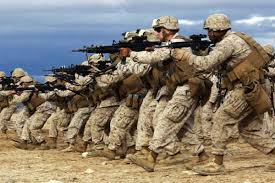According to US sources, the US will send about 3,000 additional troops to Poland and Romania to protect Eastern Europe from a potential spillover from the situation over Russian forces massing near Ukraine.
On Wednesday, Russia mocked Britain, calling Prime Minister Boris Johnson “utterly confused” and accusing British MPs of “stupidity and ignorance,” indicating that it was not in the mood for compromise.
Moscow has stationed around 100,000 troops on Ukraine’s borders and has threatened to take unspecified military action if its demands are not met; including a guarantee from NATO that Kyiv will never be admitted.
According to the Pentagon, a Stryker squadron based in Vilseck, Germany, would be dispatched to Romania, while roughly 1,700 troops, mostly from the 82nd Airborne Division, will be deployed from Fort Bragg, North Carolina, to Poland. Another 300 servicemen will relocate from Fort Bragg to Germany.
According to media sources on Twitter, US President Joe Biden said the deployment was in line with what he had informed Russian President Vladimir Putin: “As long as he is acting aggressively, we’re going to make sure we can convince our NATO partners and Eastern Europe that we’re there.”
The goal, according to Pentagon spokesman John Kirby, was to send a “strong signal” to Putin “and frankly, to the world” that NATO is important to the US and its allies.
“We know that (Putin) is also irritated with NATO. He’s made no attempt to hide it. We’ve made it clear that if the need arises, we’ll be ready to defend our NATO partners. Hopefully, this will not be the case.”
The deployment of the United States, according to Poland’s Defense Minister Mariusz Blaszczak, is a powerful statement of unity. Jens Stoltenberg, NATO Secretary-General, praised it, saying the alliance’s response to Russia was defensive and proportional.
Despite some Western countries identifying Russia’s major demands as non-starters and Moscow showing no sign of backing down, efforts to achieve a diplomatic solution continued.
According to the White House, Biden and French President Emmanuel Macron discussed diplomatic coordination and measures to impose economic repercussions on Moscow if it invades Ukraine. Macron also stated that he intends to meet with Putin soon.
On Thursday, Turkish President Tayyip Erdogan will pay a visit to his Ukrainian counterpart Volodymyr Zelensky after presenting Turkey as a mediator to defuse tensions with Russia, while German Chancellor Olaf Scholz said he would meet Putin in Moscow soon but did not specify a date.
According to the Kremlin, Putin told Johnson that NATO was not appropriately reacting to Russia’s security concerns. According to Johnson’s office, he told Putin that military intervention would be a “tragic error,” and the two promised to work together in a “dialogue spirit.”
Before the call with Putin, Johnson had accused Russia of holding a gun to Ukraine’s head, prompting a rebuke from Kremlin spokesperson Dmitry Peskov. Johnson had rescheduled his call to parliament to answer questions regarding allegations that his staff had broken COVID-19 lockdown regulations.
Peskov stated, “Russia and President Putin are willing to communicate with everyone.”
Russia’s Foreign Ministry mocked Johnson’s foreign secretary, Liz Truss, for saying in an interview that the UK was “supplying and offering extra support into our Baltic allies across the Black Sea,” referring to two bodies of water on opposite sides of Europe, “as well as supplying Ukrainians with defensive weapons.” Later, the Foreign Office of the United Kingdom stated that she was citing different geographic regions of support.
In a blog post, Russian Foreign Ministry spokesman Maria Zakharova commented, “Mrs. Truss, your knowledge of history is nothing compared to your grasp of geography.” “If anyone needs protecting from anything, it’s the globe, from British politicians’ idiocy and ignorance.”
FOX VS. BEAR
Putin had implied a day earlier, in his first public comments on the Ukraine issue this year that Russia was being obliged to defend itself against US aggression.
Washington has stated that it will not send soldiers to Ukraine to defend it from a Russian attack, but that it will impose financial sanctions on Russia and send armaments to assist Ukrainians in their defense.
Despite being under US and EU sanctions since annexing Crimea from Ukraine in 2014, Russia remains Europe’s largest energy supplier and dismisses new restrictions as a threat.
Russia’s two key requests were rejected by Washington and its allies: that Ukraine is prohibited from ever joining NATO and that troop deployments in eastern European countries that joined after the Cold War be dialed back.
El Pais, a Spanish daily, published what it claimed was a leaked copy of a US response to Russian demands, in which Washington suggested talks with Moscow on a deal that would prevent both sides from stationing offensive weapons or troops in Ukraine.
According to the memo, which appeared to be in accord with the public US position, Washington could also reassure that it had no cruise missiles in Poland or Romania, and discuss steps to avert dangerous air or sea events.
“Nothing I’ve seen suggests these documents aren’t real,” said State Department spokesman Ned Price.
“What we’ve delivered is a set of recommendations for future diplomatic interaction. If there is to be any progress, this will necessitate good faith participation and some concerted, fairly technical conversations “he stated

















